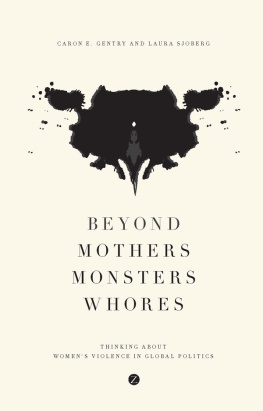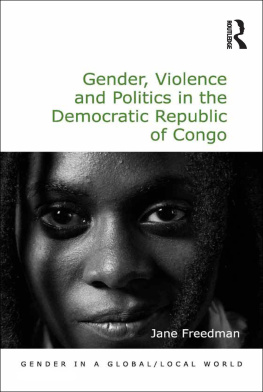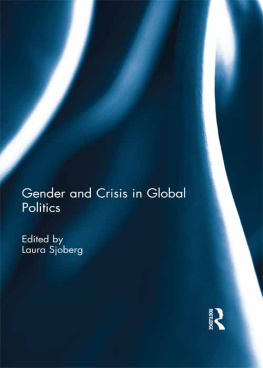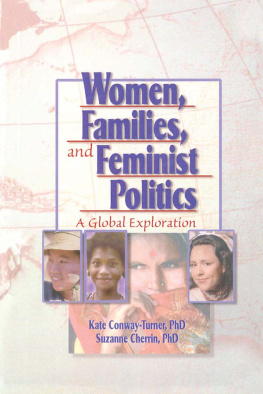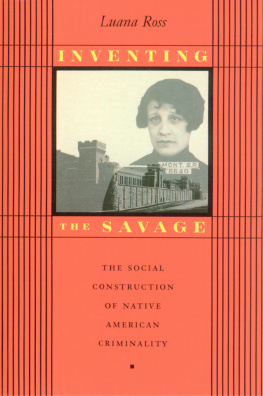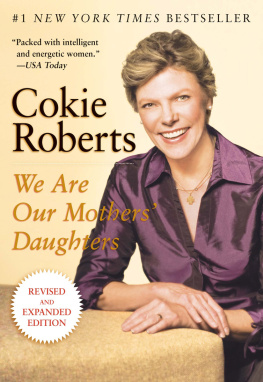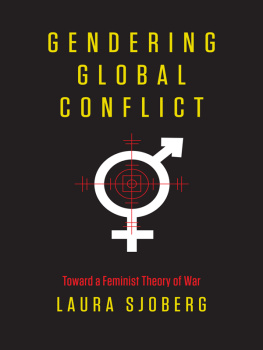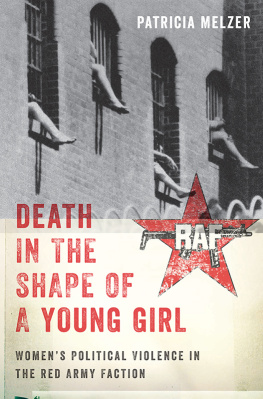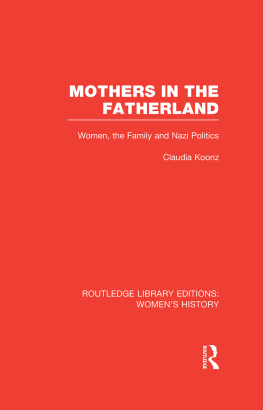
About the authors
Caron E. Gentry is a lecturer in the School of International Relations at the University of St Andrews. She is author of Offering Hospitality: Questioning Christian Approaches to War (2013) and the co-editor of Women, Gender and Terrorism (with Laura Sjoberg, 2011) and The Future of War: New Critical Essays (with Amy Eckert, 2014). Her work has been published in a number of journals of international relations and gender studies, including, recently, Critical Studies on Security , Critical Studies on Terrorism and the International Feminist Journal of Politics .
Laura Sjoberg is associate professor of political science at the University of Florida. She is author of Gender, War and Conflict (2014), Gendering Global Conflict: Towards a Feminist Theory of War (2013), Mothers, Monsters, Whores: Womens Violence in Global Politics (with Caron Gentry, 2007) and Gender, Justice, and the Wars in Iraq (2006). Dr Sjoberg is currently home-base editor of the International Feminist Journal of Politics , associate editor of International Studies Review and editor of several books and journal special issues. Her work has also recently been published in International Studies Quarterly , International Studies Review , International Studies Perspectives , International Politics , International Relations , Politics and Gender and International Political Sociology , among other places.
BEYOND MOTHERS, MONSTERS, WHORES
THINKING ABOUT WOMENS VIOLENCE IN GLOBAL POLITICS
Caron E. Gentry and Laura Sjoberg

Zed Books
LONDON
Beyond Mothers, Monsters, Whores: Thinking about Womens Violence in Global Politics was first published in 2015 by Zed Books Ltd, Unit 2.8 The Foundry, 17 Oval Way, London, SE 11 5 RR , UK
This ebook edition was first published in 2015
www.zedbooks.co.uk
Copyright Caron E. Gentry and Laura Sjoberg 2015
The rights of Caron E. Gentry and Laura Sjoberg to be identified as the authors of this work have been asserted by them in accordance with the Copyright, Designs and Patents Act, 1988
Set in Monotype Plantin and FF Kievit by Ewan Smith, London NW 5
Index:
Cover designed by www.kikamiller.com
All rights reserved. No part of this publication may be reproduced, stored in a retrieval system or transmitted in any form or by any means, electronic, mechanical, photocopying or otherwise, without the prior permission of Zed Books Ltd.
A catalogue record for this book is available from the British Library
ISBN 978-1-78360-208-7 hb
ISBN 978-1-78360-207-0 pb
ISBN 978-1-78360-209-4 pdf
ISBN 978-1-78360-210-0 epub
ISBN 978-1-78360-211-7 mobi
CONTENTS
ACKNOWLEDGEMENTS
We remain indebted to those who made the first edition of this book possible. We are in debt for the initial sponsorship of the University of St Andrews, Abilene Christian University, the Women and Public Policy Program at the Kennedy School of Government at Harvard, the Womens Studies Department at Merrimack College, the Kenan Institute for Ethics at Duke University, and the Political Science Department at Virginia Tech. Our work on the second edition has been supported by the University of Florida Department of Political Science and (again) by the School of International Relations at the University of St Andrews. We remain in debt to initial audiences at the International Studies Association conference in 2006, the 2006 ISA-West conference, and Duke University as well as to audiences at the dozen places at which we gave book talks after the first edition was published. Initial readers Christine Sylvester, Francine DAmico, Sita Rachod-Nillson, Marilyn McMorro, Fran Pilch, Cynthia Enloe, Susan Northcutt, Melissa Brown, Sandra McEvoy, Christopher Marcoux, David Winter, Jindy Rosa and Louise Knight influenced the first edition, along with conversations with Carol Cohn, Lauren Wilcox, Jenny Lobasz, Sandy Whitworth, Suzanne Bergeron, Susan Wright, Theresa Lund, Rose Shinko and (the late) Sally Ruddick. The second edition has grown out of conversations with a growing (and now almost uncountable) research community addressing issues of womens violence in global politics. The authors in our (2011) edited Women, Gender, and Terrorism made us continue thinking about developing this work, as have Sandy McEvoy, Megan MacKenzie, Jessica Auchter, Linda hll and Laura Shepherd. Ellen McKinley, our first editor at Zed, made this book possible for us.
When we undertook the first edition of this book, we were looking to inspire feminist IR scholars to think about the existence and signification of womens violence in global politics. We are awed and humbled by the quality and quantity of work that has taken up that call over the last decade, and hope that the second edition of this book is up to the task of engaging that growing and vibrant research programme.
Caron
When the co-authoring experience goes well, it goes very well it is inspirational and it drives a project to a place that couldnt be achieved solo. Our writing relationship has always been a good one and Laura Sjoberg is more than a co-author, she is a friend, a sounding board and a voice of encouragement. When people tell me that they enjoyed reading the first edition, I often respond that it was fun for us to write. This isnt a fun topic, but it is a creative process and what made writing both editions fun was waiting to see where Laura would push my thinking and where I could push hers. Thus, I want to thank Laura for that tentative planning session long ago in San Diego that resulted in a long, sustained and engaging conversation and friendship.
Since the first edition, I have moved back to the University of St Andrews, where I finished a PhD and am now a member of academic staff. Thus, my professors are now my colleagues. Never once have my former professors made me feel as if I am still a student; instead, I have found myself surrounded by some of the most collegial and supportive peers, including Nick Rengger, Ali Watson, Gabriella Slomp and Rick Fawn. They are joined by Jeffrey Murer, Bill Vlcek, Faye Donnelly, Tony Lang and Karin Fierke. I have always found my students to be a source of inspiration and would like to specifically thank those in IR 4542 and IR 5042 for some excellent insights and perspectives. Finally, I would like to thank Hannah Partis-Jennings for some amazing conversations. I cannot wait to see where your very promising career goes.
Finally, to my friends and family for all of their support: the patience of my partner, Phil, is never ending; my parents continue to have a massive supply of enthusiasm; and finally my love and hope for the future lie with my nieces, Ela and Ashlyn, and my brand-new nephew, John.
Laura
First and foremost, I want to thank Caron Gentry, who has not only been the worlds best co-author and co-editor for what is now my entire career, but an amazing friend as well. Without her, I never would have been able to pursue this project, and a significant portion of my research agenda would not even have been imaginable. There are people who do not give her the greater part of the credit for this project. They are wrong, and ridiculous.
My acknowledgements to the first edition of this book express thanks for Hayward Alkers mentorship. It has been eight years since the world lost Hayward now, and I miss him more, as a mentor and as a scholar, every day. Those eight years have been rocky, but I have been constantly supported by my former PhD adviser and forever-mentor Ann Tickner. Friends in the field have rejuvenated my interest in doing this, and supported me through thick and thin, including but not limited to: Dan Nexon, Cameron Thies, Brandon Valeriano, Doug Gibler, Pat James and Sara Mitchell. My journal co-editors (Cynthia Weber and Heidi Hudson at the International Feminist Journal of Politics and Janice Bially Mattern and Kelly Kadera at International Studies Review ) have also been a source of inspiration in this process. Christian Pierre-Canel did a fair amount of research for the second edition. Yarden Kakon read and edited the last draft.
Next page
